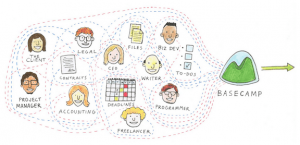
Let’s face it. The federal government is funded by tax dollars and it is not in their economic interest to have a largely self-employed workforce. Let’s take a look at a tale of two equally sized cities. In one city, everyone works for one large corporation with several thousand employees. In the other city, everyone is a self-employed small business.
1. The large corporation sends out one large check every pay period throughout the year for all employees’ withholdings, along with a single report for the IRS to process.
The other city sends out hundreds of individual checks and hundreds of forms as part of its quarterly estimates. Since they all do this quarterly, the IRS gets its money less often. Moreover, many businesses simply have such poor accounting controls that they don’t even send in their estimated quarterly taxes at all and hope to fix it with one deposit at year-end. This means that the IRS gets even less predictable income from the self-employed city.
2. Small businesses do not have in-house tax accounting experts and are likely to make more tax filing mistakes than the single large corporation, causing the IRS to expend significantly more time and effort on the many small businesses, only to collect fewer taxes.
3. Then, there is the fact that the self-employed can take advantage of tax deductions that employees of the large corporation cannot. Self-employed people can reduce their taxable income with home office deductions. Not only does this include deducting a portion of your rent or mortgage payment, but also a portion of your utilities, insurance, and repairs. When you use your personal vehicle for any business-related purpose, including shopping trips to pick up office supplies or meeting a client for lunch, you deduct the General Services Administration (GSA) mileage rate based on the distance you traveled. When you travel out of town for business, you can deduct expenses for food and lodging based on the GSA Per Diem Rate, even when a portion of the trip may be used for non-business purposes.
For example, I own residential properties in the state of Virginia. I make a trip out there about once a year. We have family in Virginia and my trip often coincides with the archery deer season, so while I spend a few days talking and dealing with tenant issues, I will take a few personal days to get in an Archery hunt and visit with family. I’m able to deduct 100% of the travel costs (Airfare and Mileage) plus lodging and meals for the days that I allocate to business activities.
Note: Whereas the IRS traditionally has allowed businesses to deduct 50% of a business meal expense, assuming that you and your client are both eating, as part of the “Consolidated Appropriations Act, 2021” for tax years 2021 and 2022, 100% of restaurant meals are deductible. So, there is such a thing as a “Free Lunch”.
4. Then, there are all those gadgets and services that have value both to the business and business owner on a personal level that they can pay for with pre-tax dollars rather than with after-tax dollars like everyone else. For example, my business pays for my cell phone and my monthly cell phone bill. I also get to use pre-tax dollars to pay for my high-speed Internet connection and computer hardware and software. Then, there are those things I need for my business such as a drone to inspect our properties as well as camera and video equipment that I may occasionally use during my vacations to capture great vacation images and video footage.
When you take into account that the government receives less frequent income tax payments, quarterly vs weekly or biweekly, and that the IRS has to expend far more effort to process and audit income tax returns from lots of small businesses, it is easy to see the negative effect the shift from working at a large corporation to more self-employed businesses has on government resources. Coupled with the fact that the tax code provides all kinds of special tax deductions and allows self-employed business owners to use pre-tax dollars in ways employees of corporations can’t, further makes the case that the shift from people working for a corporate paycheck to more self-employed is not in the best economic interest of the government in the long run.
In closing, while there are many tax advantages to being self-employed vs collecting a corporate paycheck, it is always best to consult your tax professional since everyone’s situation is different.
Business & Finance Articles on Business 2 Community
(40)







